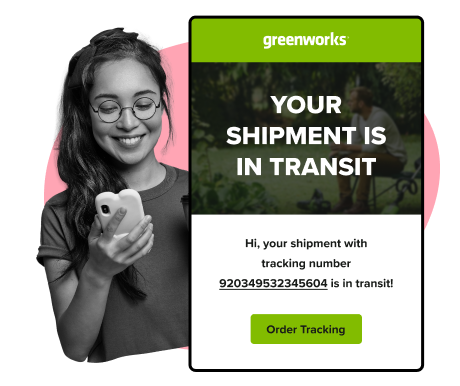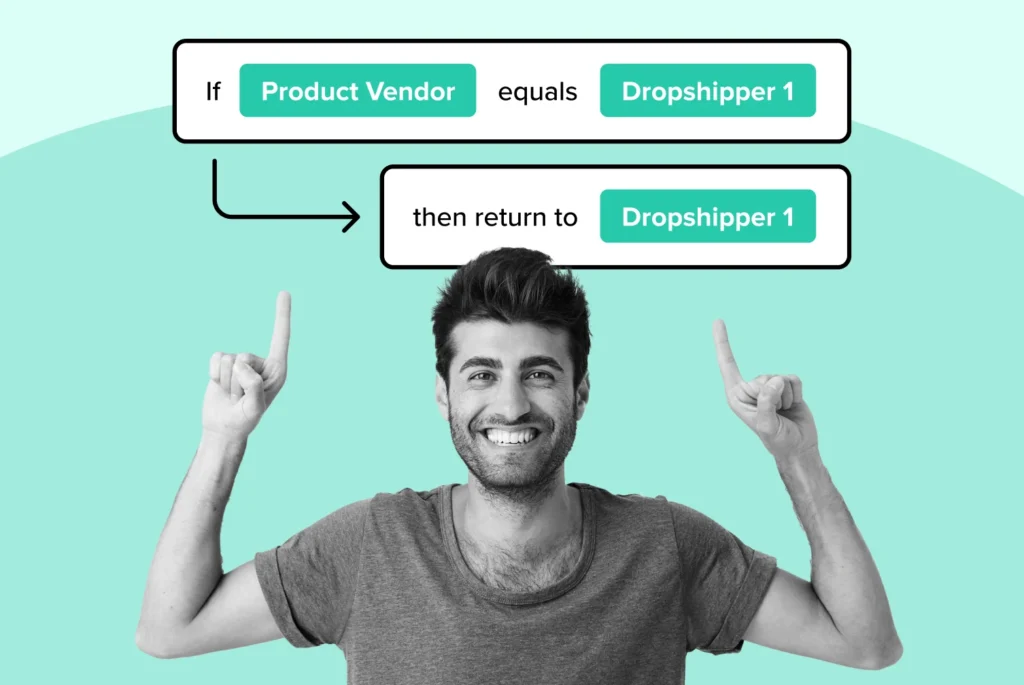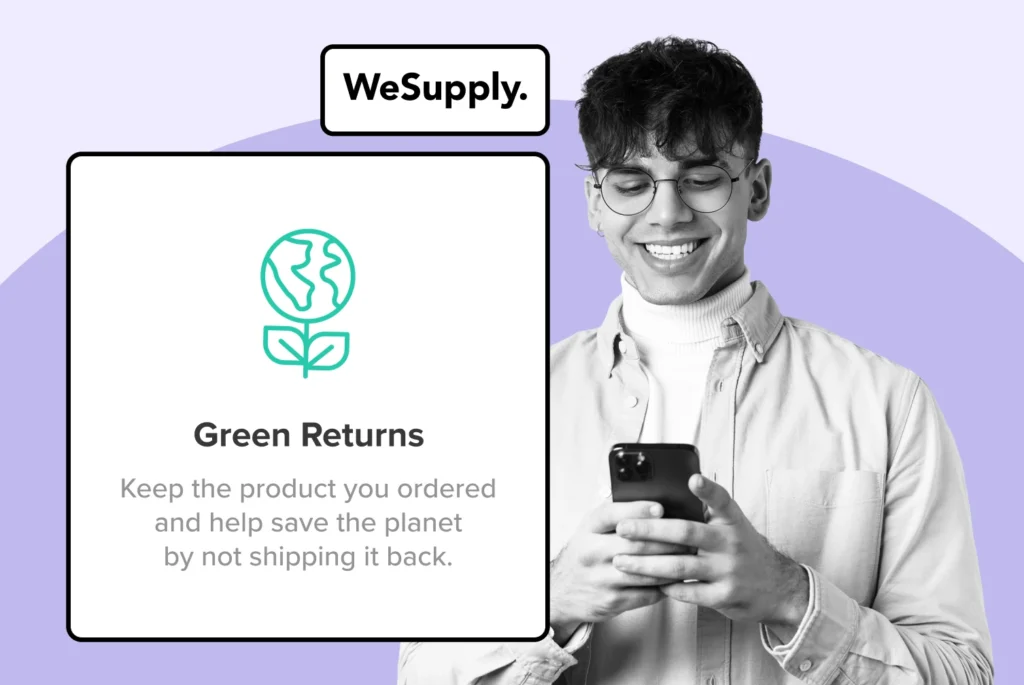
Effective Strategies to Reduce Ecommerce Split Shipments
Let’s navigate the complexities of inventory, shipping policies, and customer communication with confidence!
Shipping, Tracking & Notifications
Boost customer experience and reduce support tickets
Realtime order and shipment tracking
Proactive order and shipping notifications
AI-Enhanced Discounted Labels
Predictive pre-purchase estimated delivery dates
Self-Serivce branded order tracking
Effortless experience delivered
Identify and Resolve Order Issues
Realtime order and shipment tracking
Make returns profitable and delight customers
Flexibility to define any return destinations & conditions
Simplify returns for your customers and team
Incentivize exchanges over returns
Returns management made easy for your team
Returns management made easy for your team
Easy claims and smart upsells
Understand why your customers are returning
In-Store & Curbside Pickup
Unify the online and the in-store experience
Hassle-free pickup experience for customers
In-Store dashboard to keep operations streamlined
In-Store and Online orders unified
Drive foot-traffic to your stores
Shipping, Tracking & Notifications
Boost customer experience and reduce support tickets
Realtime order and shipment tracking
Proactive order and shipping notifications
AI-Enhanced Discounted Labels
Predictive pre-purchase estimated delivery dates
Self-Serivce branded order tracking
Effortless experience delivered
Identify and Resolve Order Issues
Realtime order and shipment tracking
Make returns profitable and delight customers
Flexibility to define any return destinations & conditions
Simplify returns for your customers and team
Incentivize exchanges over returns
Returns management made easy for your team
Returns management made easy for your team
Understand why your customers are returning
In-Store & Curbside Pickup
Unify the online and the in-store experience
Hassle-free pickup experience for customers
In-Store Dashboard to keep operations streamlined
In-Store and Online orders unified
Drive foot-traffic to your stores
Boost customer experience and reduce support tickets
Realtime order and shipment tracking
Proactive order and shipping notifications
AI-Enhanced Discounted Labels
Predictive pre-purchase estimated delivery dates
Self-Serivce branded order tracking
Effortless experience delivered
Make returns profitable and delight customers
Flexibility to define any return destinations & conditions
Simplify returns for your customers and team
Incentivize exchanges over returns
Returns management made easy for your team
Equip your team for precise return checks.
Easy claims and smart upsells
Understand why your customers are returning
Unify the online and the in-store experience
Hassle-free pickup experience for customers
In-Store Dashboard to keep operations streamlined
In-Store and Online orders unified
Drive foot-traffic to your stores
Find the answer to all your questions
Take a step by step trip through our functionality to see how we can improve your ecommerce processes.
Explore the most comon questions about WeSupply
Calculate the ROI that WeSupply can bring you
Read actionable articles on how to optimize your post-purchase experience and decrease support tickets
Get inspired by stories of how our customers implemented an effortless post-purchase experience
Wondering if WeSupply is a good fit for you? Read through our use cases to see how we can help you increase conversion & improve CX!
A Deep Dive into Top Companies' Order Tracking & Returns Strategy
Find the answer to all your questions
Explore the most comon questions about WeSupply
Calculate the ROI that WeSupply can bring you
Request a no strings attached review of your current shopping experience and missed conversion opportunities
Take a step by step trip through our functionality to see how we can improve your ecommerce processes.
Read actionable articles on how to optimize your post-purchase experience and decrease support tickets
Get inspired by stories of how our customers implemented an effortless post-purchase experience
A Deep Dive into Top Companies' Order Tracking & Returns Strategy
Wondering if WeSupply is a good fit for you? Read through our use cases to see how we can help you increase conversion & improve CX!

As e-commerce thrives, the urgent need to minimize its environmental impact has brought eco-friendly packaging to the foreground. Consumers are actively seeking brands that demonstrate a commitment to sustainability, making the shift to environmentally responsible packaging practices a crucial move for any online business. This article explores not only the ‘why’ behind eco-friendly packaging in eCommerce but also the ‘how’, providing actionable insights for businesses ready to embark on a sustainable packaging journey.
Eco-friendly packaging in eCommerce is essential due to its lower environmental impact and alignment with consumer demand for sustainability; it helps in reducing waste, lowering carbon emissions, and enhancing brand reputation.
Sustainable packaging materials, including bioplastics, recycled paper, cardboard, and agricultural byproducts, offer greener alternatives to traditional packaging and are becoming increasingly significant in revolutionizing the eCommerce industry.
Eco-friendly packaging strategies should involve assessing packaging needs, partnering with sustainable suppliers, and educating customers on sustainable unboxing practices to ensure effective integration into eCommerce operations.
WeSupply pioneers eco-friendly eCommerce by directing returns to recycling centers, offering a branded returns portal, and facilitating a self-service process desired by shoppers. Its Green Returns option reduces waste by letting customers keep low-cost items, while automated return label generation and printerless returns via QR codes minimize paper use. Additionally, WeSupply supports convenient in-store and curbside returns. Embrace sustainability and efficiency in your returns process. Get Started with WeSupply and transform your post-purchase experience.
In our consumer-driven world, packaging is everywhere, especially in the realm of eCommerce. However, traditional packaging is posing serious environmental challenges due to its non-biodegradable nature and excessive use. Enter sustainable packaging – a solution that is not only environmentally friendly but also aligns with the rising tide of eco-conscious consumers. By adopting sustainable packaging solutions, businesses can make a positive impact on the environment and cater to the preferences of their customers.
Sustainable packaging in eCommerce encompasses a vast range of practices, from using fewer materials and more environmentally friendly production processes to ensuring ease of disposal in a sustainable manner. And it’s not just about reducing environmental harm; using eco-friendly packaging sets eCommerce stores in tune with their customers’ values, fostering a more considerable resonance and success.
Adopting eco-friendly packaging has moved beyond being a mere convenience in eCommerce, it has become indispensable. Traditional packaging production is energy-intensive, emits greenhouse gases, and significantly contributes to a business’s carbon footprint. However, by switching to packaging made from recycled or reusable materials, eCommerce stores can play their part in preserving the environment.
Some benefits of eco-friendly packaging include:
Reducing waste and landfill space
Lowering carbon emissions
Enhancing brand reputation and customer loyalty
Meeting consumer demand for sustainable products
By making the switch to eco-friendly packaging, eCommerce businesses can make a positive impact on the environment while also attracting environmentally conscious customers.
Furthermore, regulatory measures in various regions are propelling eCommerce businesses to embrace sustainable packaging practices, especially those related to single-use plastics and recycling.
Examining traditional packaging materials such as plastic and styrofoam reveals their non-biodegradable nature, which results in pollution and landfill build-up. It’s alarming to know that over 2 billion tons of waste are sent to landfills annually, with packaging waste constituting a significant portion of this figure.
The production of new packaging from existing materials consumes less energy than manufacturing from raw materials, which further underscores the environmental benefits of recycled plastic packaging. Most food packaging, especially plastic packaging, is single-use and not recycled, contributing to the plastic pollution crisis in oceans, declared by the United Nations as a “planetary crisis.”
On the other side of the equation, we have the consumers. A growing awareness among consumers about the importance of sustainability has led to an increased demand for sustainable products, with packaging being a critical factor. A significant percentage of consumers are considering the environment in their purchasing decisions and prefer brands demonstrating a commitment to eco-friendly practices.
This rise in eco-consciousness among consumers is propelling the transition to packaging that is recyclable, compostable, or derived from renewable resources.
As eCommerce businesses are realizing the significance of sustainable packaging, they are also recognizing the potential of various materials that can serve as eco-friendly alternatives to traditional ones. These materials are not only sustainable but also capable of revolutionizing the eCommerce industry.
One of the key trends in sustainable packaging is the shift towards plant-based materials. Bioplastics derived from renewable biomass sources such as corn starch, sugarcane, or other plant materials offer a sustainable alternative to petroleum-based plastics.
Some of these bioplastics, like Polylactic Acid (PLA) and Polyhydroxyalkanoate (PHA), are even compostable, making them a true green solution for compostable packaging.
A comeback is being made by the old players in the packaging game – recycled paper and cardboard. Corrugated packaging, often made from 70% to 100% recycled material, is renewable, collapsible, and reusable, reducing both environmental impact and packaging costs.
Other innovative applications of recycled paper and cardboard are also being explored, contributing to the rise of sustainable packaging.
Agricultural waste, once considered a problem, is now part of the solution. Byproducts of food production and processing contain valuable compounds like proteins, carbohydrates, and lipids, which can be utilized to develop biopolymers and biocomposites for sustainable packaging. These materials not only reduce the environmental impact but also provide a second life to what would otherwise be discarded, making them a true testament to the saying, “Waste not, want not.”
The design of sustainable packaging goes beyond merely selecting appropriate materials. It’s about designing with care – care for the environment, care for the consumer, and care for the future. This involves a range of practices, from minimalism in packaging size and material to encouraging a second life for packaging through reusability.
Minimalism stands as a central principle in the design of sustainable packaging. This approach emphasizes:
the reduction of packaging size and material usage to the minimum necessary for product protection and branding requirements
minimalist packaging design is all about functionality and simplicity
it not only reduces waste but also enhances brand recognition.
Encouraging a second life for packaging is another way to mitigate its environmental impact. By designing for reusability, materials can be used multiple times, thereby extending their lifespan and reducing waste.
Brands like Glossier, for example, are innovating in this area by using minimalistic pink bubble wrap pouches instead of traditional boxes, reducing material usage and supporting reusability.
Custom packaging solutions can serve as a potent weapon in a brand’s sustainability toolkit. By integrating branding with green initiatives, these solutions allow businesses to demonstrate their commitment to sustainability while enhancing their brand image.
Through the use of sustainable design principles, brands can create packaging that not only stands out but also aligns with the values of their eco-conscious customers.
How then, can eCommerce businesses incorporate eco-friendly packaging into their operations? The answer lies in a combination of assessing packaging needs, partnering with sustainable suppliers, and educating customers on sustainable unboxing practices.
Assessing packaging needs is the first step in implementing eco-friendly packaging solutions. This involves considering the safety and security of products during shipping as well as the packaging’s environmental impact.
Efficient packaging not only helps to reduce packaging waste but also minimizes environmental impact by using fewer resources.
In order to procure eco-friendly packaging materials, forming partnerships with suppliers who uphold sustainability is advantageous. This involves evaluating their practices, such as their sourcing and manufacturing processes.
Using recycled materials like bioplastics made from renewable resources and recycled content can contribute to more sustainable packaging choices, including biodegradable packaging and eco friendly packaging options.
Lastly, instructing customers on sustainable unboxing procedures is a vital aspect of integrating eco-friendly packaging solutions. This involves encouraging them to repurpose or recycle the packaging materials, thereby reducing waste.
Transparency in sustainability practices can also help build trust with consumers and strengthen brand loyalty.
Printerless returns via QR code
Book a quick call with our experts to see how WeSupply’s Printerless Returns improves your customer experience by allowing them to ship their returns without a printer.
Embracing eco-friendly packaging is advantageous not only for the environment but also for savvy business operations. From enhancing brand image to increasing profitability, sustainable packaging provides a wealth of benefits for eCommerce businesses.
While the initial cost of sustainable packaging materials may be higher, the long-term savings from reduced waste and energy usage often result in them being more economical than traditional options. Sustainable packaging materials, such as recycled paper or biodegradable plastics, can reduce waste management fees, leading to long-term cost savings for businesses.
Eco-friendly packaging can significantly enhance a brand’s image as customers experience the brand’s commitment to sustainability firsthand through the packaging.
The employment of sustainable packaging by a brand resonates with customer values, thereby nurturing enhanced customer loyalty.
Looking ahead, it’s evident that sustainable packaging will persist in playing a pivotal role in eCommerce. From innovations on the horizon to potential regulatory shifts, let’s explore what’s next for sustainable packaging.
The future of sustainable packaging is bright with a host of innovations on the horizon. From the increased use of biodegradable materials to the development of plant-based plastics and mushroom packaging, these innovations offer a greener alternative to traditional packaging materials.
With the escalating emphasis on sustainability, we can foresee potential regulatory changes that may influence future packaging requirements. Financial penalties are the primary regulatory vehicle for enforcing sustainable packaging, with some countries also using incentives to encourage positive changes.
It is equally important to recognize the role of companies like WeSupply in championing eco-friendly practices within the eCommerce sector. By implementing intelligent dispositions that direct returns to appropriate recycling channels, WeSupply not only mitigates waste but also enhances environmental sustainability. Their approach includes a range of innovative solutions aimed at streamlining the return process, reducing unnecessary waste, and fostering a culture of sustainability among both retailers and consumers.
Key features of WeSupply’s eco-friendly approach include:
Intelligent Dispositions: Directs returns to recycling centers, reducing environmental impact.
Branded Returns Portal: Offers a branded returns experience to boost customer loyalty.
Keep the Item and Reduce Waste: Encourages customers to keep low-cost items, avoiding unnecessary shipping and landfill waste.
Automatic Return Labels Generation: Facilitates easy return label creation for customer convenience.
Printerless Returns via QR Code: Offers a printerless return option, reducing paper waste.
Return In-Store or via Curbside: Supports in-store and curbside returns, aligning with trends set by major retailers.
By prioritizing environmental responsibility alongside customer convenience, WeSupply exemplifies how businesses can contribute to a more sustainable future. Ready to make your returns process as green as it is efficient? Book a Demo with WeSupply today and join the eco-friendly eCommerce revolution!
The journey towards sustainable eCommerce is ongoing. As we continue to innovate and explore new ways to reduce our environmental footprint, it’s clear that eco-friendly packaging will play an integral role in shaping the future of eCommerce.
Given the current circumstances, it’s imperative for businesses to initiate the implementation of eco-friendly practices and pledge commitment to sustainability.
In summary, eco-friendly packaging in eCommerce isn’t just a trend – it’s a necessity. As consumers become more eco-conscious and regulations become stricter, businesses must respond by adopting sustainable packaging practices. From the use of biodegradable materials to the implementation of minimalist designs and the promotion of reusability, there are numerous ways for eCommerce businesses to make their packaging more sustainable. The journey towards sustainability is an ongoing one, but with each step, we get closer to a more sustainable eCommerce industry.
WeSupply is at the forefront of integrating eco-friendly practices in eCommerce, offering a sustainable post-purchase solution. Its intelligent dispositions direct returns to recycling centers, making a significant environmental impact. The platform enhances customer loyalty through a branded returns portal and provides a self-service process that shoppers desire, allowing for a frictionless returns experience. Green Returns encourage customers to keep low-cost items, reducing waste and increasing satisfaction. WeSupply also automates the generation of return labels and introduces printerless returns via QR codes, cutting down on paper use. Furthermore, it supports in-store and curbside returns, aligning with consumer convenience trends. WeSupply combines sustainability with technological innovation, promoting eco-friendly solutions in eCommerce.
Combat inconvenience with proactivity & self service
Book a quick call with our experts to see how WeSupply can help you make returns easy for your customers with a beautiful, self-service solution that makes their experience easier while also providing new ways to lower costs and earn back revenue.
The most eco-friendly packaging is made from compostable materials like bagasse, bamboo, molded pulp, or mushroom mycelium, as they break down naturally and can be composted alongside organic waste.
The best packaging for e-commerce is corrugated shipping boxes, as they are the most popular choice for packaging materials in this industry.
Eco-friendly packaging solutions for e-commerce include cardboard, paper-based packaging, renewable packaging, compostable poly mailers, recycled kraft shopping bags, biodegradable packing tape and stickers, and recycled corrugated cardboard boxes. These materials are easily recyclable and biodegradable, making them a sustainable choice for businesses.
To implement sustainable packaging practices, eCommerce businesses can assess their packaging needs, partner with sustainable suppliers for eco-friendly materials, and educate customers on sustainable unboxing practices. This will help reduce the environmental impact of their packaging.
WeSupply plays a significant role in promoting eco-friendly eCommerce practices by directing returns to recycling centers, enabling a reduction in environmental impact. This initiative is part of their broader commitment to sustainability.
WeSupply simplifies the return label generation process by enabling customers to automatically generate return labels. This convenience ensures that the returns process remains smooth, even when staff are unavailable.
Yes. WeSupply has an Official Shopify App. You can download it and start integrating with your Shopify Store.
Yes, WeSupply has an official extension for Magento. The WeSupply x Magento integration allows for automating order tracking experiences, reducing customer inquiries, automating shipping email and SMS notifications, and providing a fully branded order tracking experience
Yes, WeSupply has an official BigCommerce App. You can integrate WeSupply with your BigCommerce store to improve your post-purchase customer experience.

Learn How To Create Successful Post Purchase Email Campaigns
Build an effective post-purchase email flow that helps you increase customer satisfaction and drive revenue growth!

Let’s navigate the complexities of inventory, shipping policies, and customer communication with confidence!

Let’s examine the underlying factors of return trends and identify sustainable practices crucial for the future of retail!

How to marry profitability with responsibility: From choosing eco-friendly packaging to implementing low-carbon shipping methods.

This article demystifies dropshipping, offers clear steps for getting started, and divulges expert tactics for thriving in online retail!

This guide distills the crucial mistakes that could be undermining your eCommerce success and equips you with the insights to avoid them!

This isn’t about reinventing the wheel: it’s about making smarter, evidence-based decisions that propel your eCommerce venture forward!

Discover practical, actionable advice for incorporating sustainable eCommerce into the core of holiday commerce practices!

The essential guide to making circular economy eCommerce returns practical and profitable, helping you step away from waste!

Insights on planning your return policy, adapting to customer needs, and ensuring your eCommerce footprint is as light as possible!